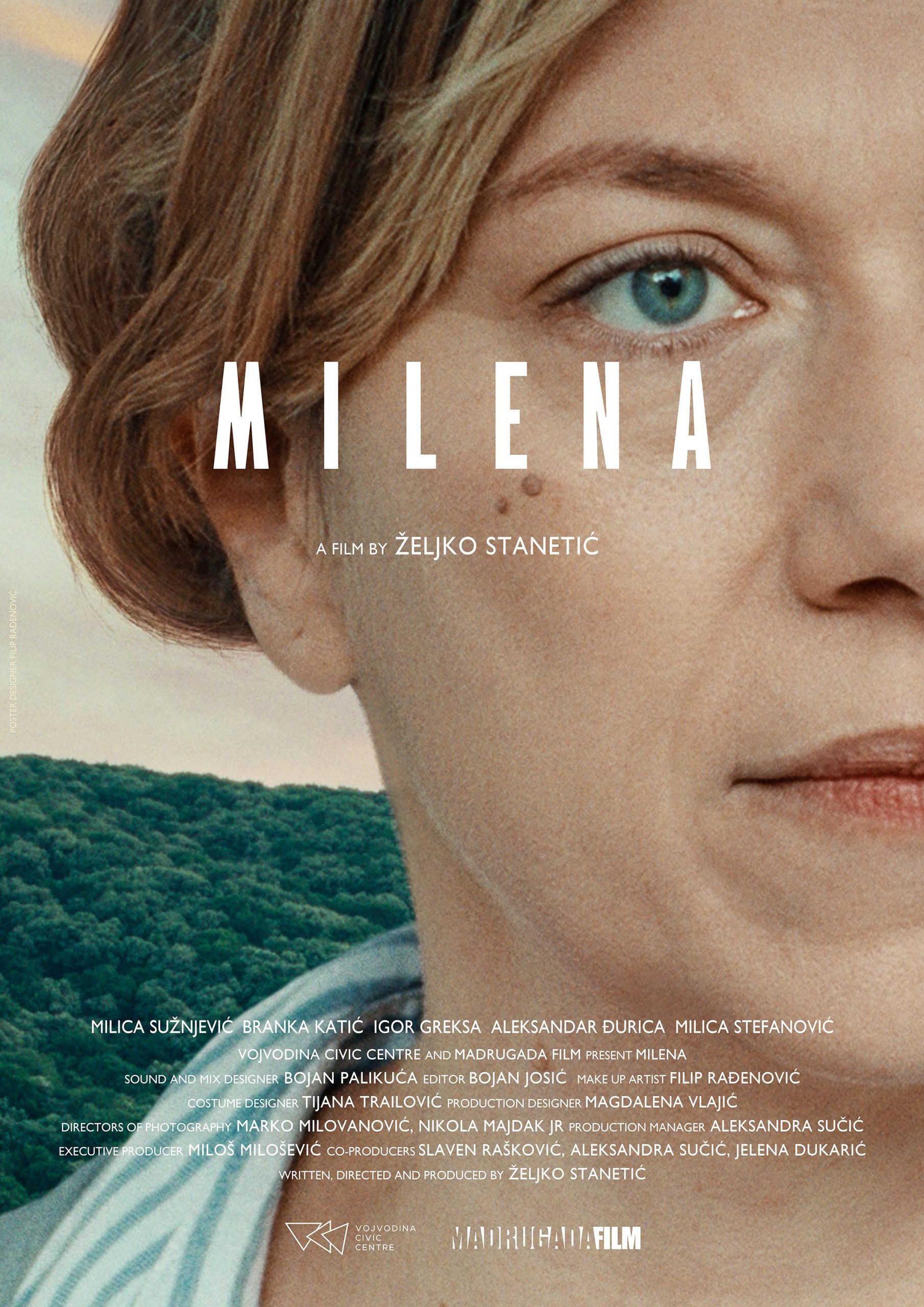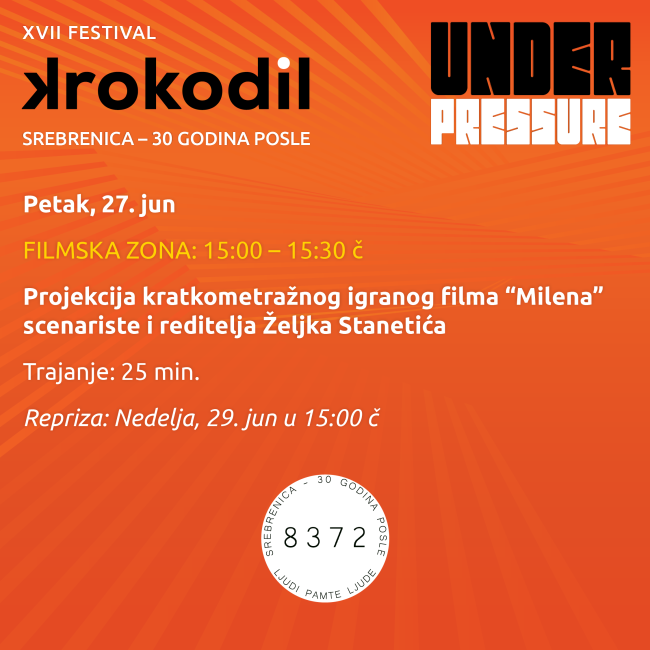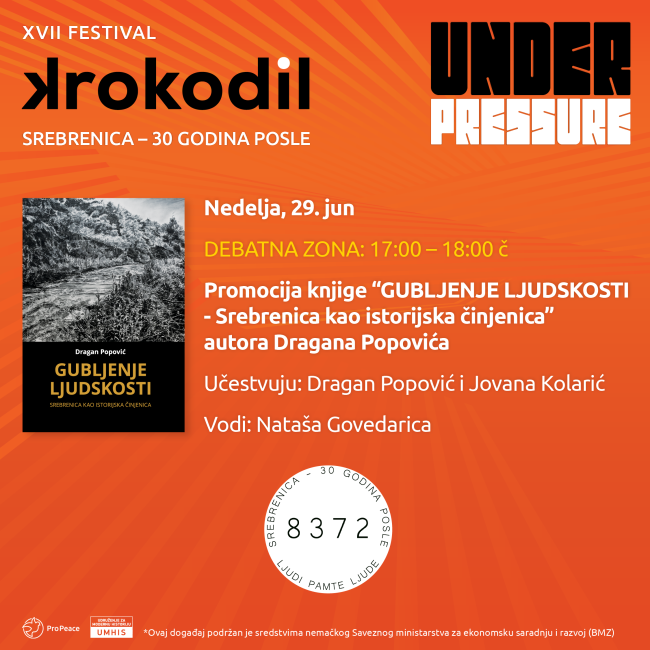
11 Jun Film screening of MILENA and LOSING HUMANITY book promotion at KROKODIL 2025
You are cordially invited to attend the KROKODIL Festival film zone on Friday, June 27th, and Sunday, June 29th, commencing at 3:00 PM, for a screening of the film “Milena,” written and directed by Željko Stanetić. Following the film on Sunday, June 29th, from 5 PM, we invite you to join us in the Debate Zone for the promotion of the book “Losing Humanity” by author Dragan Popović. Nataša Govedarica will be in conversation with the author, Dragan Popović, and Jovana Kolarić.
This program is realized within the framework of the program “Srebrenica: 30 Years Later?” and in cooperation with the organization Pro Peace.
ABOUT THE FILM
Twenty years after Milena and Stevan fled from war-torn Croatia to Serbia, a journalist investigating refugee stories comes to speak with them, unaware that this interview will be different from the rest she has conducted until now.
With the arrival of Jelena, a journalist investigating the experiences of refugees during the war, begins Milena and Stevan’s retelling of 1995, the year they fled their home in Croatia. Desperate to escape the oncoming danger, they embarked on a journey to Serbia hoping to put the war behind them only to be swept up in it once they arrived. The desire for freedom turns the Milić family from victims into indirect accomplices in the execution of one of the most atrocious war crimes that occurred during the dissolution of Yugoslavia.
Stevan’s need for a confession forces him to share secrets that have been dreading Milena for the past 20 years.
Željko Stanetić was born in 1986 in Sremska Mitrovica, Yugoslavia. During his Bachelor’s studies of journalism at the Department of Media Studies of the Philosophical Faculty of the University of Novi Sad he focuses his work within the fields of transitional justice and dealing with the past. Working for Vojvodina Civic Center since 2012, as one of its founders, has given him the invaluable experience in embracing contemporary and inventive approaches to exploring themes of the war consequences, reconciliation, and culture of remembrance. He currently lives between Novi Sad (Serbia) and Barcelona (Spain). This is his first short fiction film.
ABOUT THE BOOK
The book Losing Humanity – Srebrenica as a Historical Fact by historian Dragan Popović is a historiographical study of the Srebrenica genocide in July 1995. The book deals with the course of the crime itself, including its planning, execution, and concealment, as well as the periods before and after July 1995, in order to provide a complete picture of this important and traumatic event from the Yugoslav wars. Among the topics covered are Serbia’s and the world’s relationship to the Srebrenica crime, Srebrenica’s impact on international law, international relations, and the development of science, as well as narratives of denial of the crime. The book is based on extensive archival material from the Hague Tribunal, domestic courts, and human rights organizations, as well as existing literature.
Dragan Popović is a historian and long-time human rights activist. He completed his undergraduate and master’s studies at the Faculty of Law in Belgrade, and defended his doctoral dissertation entitled “Changes in the Politics of History and Culture of Remembrance in Europe – The Case of Serbia 1980-1990” at the Department of History of the Faculty of Philosophy in Belgrade. For years, he has been researching the culture of remembrance, politics of history, nationalism, and the history of Yugoslavia, primarily through research and practical work in civil society organizations. He has published numerous analyses and reports in the fields of human and minority rights, rule of law, and dealing with the past, and has lectured at numerous schools, seminars, and workshops dealing with these topics. His works related to the history of Yugoslavia, the culture of remembrance, and nationalism have been published in domestic and foreign scientific journals. He is from Kraljevo, and lives and works in Belgrade.
Jovana Kolarić graduated in sociology in Novi Sad and was also a fellow of the Alliance for Historical Dialogue and Accountability program at Columbia University, within the Institute for the Study of Human Rights. Since 2012, she has worked at the Humanitarian Law Center, where, among other things, she has worked on documenting human losses during armed conflicts in the former Yugoslavia, as well as documenting and collecting evidence of potential perpetrators. In the last year, she has focused on monitoring war crimes trials in domestic courts, analyzing procedures and relevant strategic documents. As a researcher, she collaborated on the documentary series *Belgrade Circle* (authors Zoran Amar and Bojan Tončić) and the interactive narrative *The Last Tango in The Hague* (SENSE – Center for Transitional Justice). She occasionally writes columns for the portals Nomad.ba and Peščanik.
Nataša Govedarica graduated in dramaturgy from the Sarajevo Academy of Performing Arts. She has also won awards for radio dramas produced on BH Radio 1, as well as for co-authoring the play *Hypermnesia* by Selma Spahić and *Why Did Mr. R Go Crazy* by Bobe Jelčić. She holds a Master’s degree in Human Rights from the Center for Interdisciplinary Postgraduate Studies of the Universities of Sarajevo and Bologna. She has published the studies *Moving Images of Human Rights* and *Serbia – A Land of Uncertain Past*, focusing on issues of nationalism and revisionism, which she also addressed as a visiting researcher at Columbia University (NYC). Since 2014, she has been the program director of the Serbian branch of the German organization Pro Peace. She is from Sarajevo, and has lived in Belgrade since 2008.
This event is supported by funds from the German Federal Ministry for Economic Cooperation and Development (BMZ).
SREBRENICA – 30 YEARS AFTER
On the occasion of commemorating 30 years since the genocide in Srebrenica, civil society organizations from Serbia are joining forces in order to realize a series of public events and artistic programs under the name “30 years after” in June and July 2025. The activities aim to remind Serbian institutions that they are obliged to respect judicial facts, which include the obligation to honor the victims and develop a culture of remembrance, in which there will be no room for denying, negating or distorting the events that took place in Srebrenica, which the International Criminal Tribunal and the International Court of Justice qualified as genocide.
Organizations and individuals: Humanitarian Law Center, Youth Initiative for Human Rights, Heartefact, KROKODIL, ProPeace, Helsinki Committee for Human Rights in Serbia, DAH Theatre, Škart collective, Vojvodina Civic Centre (VCC), Center for Cultural Decontamination (CZKD), CK13, Women in black, Civic Initiatives, Darija S. Radaković, Aleksandar Todosijević, Milica Pekić, Simona Ognjanović, Ana Panić. Video inserts from DAH Theater performances and collaboration with Women in Black, as well as an insert from Lazar Stojanović’s movie The Scorpions, a Home Movie will be presented.
Program of the Festival see here OVDE
For tickets visit: https://new.gigstix.com/event/xvii-festival-krokodil-under-pressure-beograd-jun-2025/





Sorry, the comment form is closed at this time.